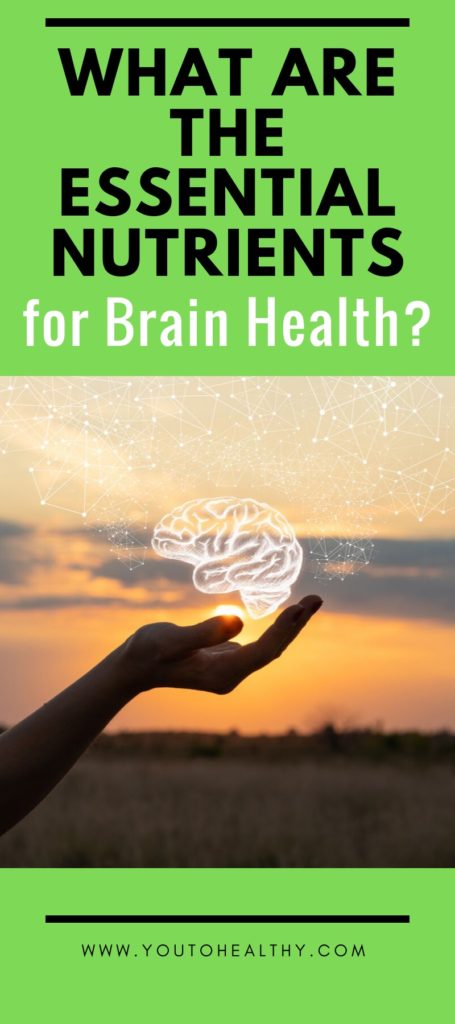Scientists have raised many ambitious questions surrounding essential nutrients for brain health. The brain’s health has long tantalized the world’s best researchers, due to the sophisticated functions that make up your mind.
Physiologically, your brain is like the top manager’s office at the headquarters of a company. It steers your consciousness and controls all of your body’s functions. Among body systems, your brain is one of the most valuable. It is therefore one of the most important to maintain.
Your Brain at Different Ages:
In infancy, the brain needs the right nutritional supply to grow healthy.
As a teenager, you need a functioning brain to study, concentrate, and get good grades in school.
Next, when you are middle-aged, you are required to have a sharp brain for better decision-making, personal relationships, and communication skills. Your social ability relies largely on your appearance, wit, and social intelligence, all of which require your brain.
Finally, when you get older, your brain needs enough nutrients to maintain a strong capacity for recollection. It also helps combat diseases like Alzheimer’s disease, dementia, and brain atrophy.
If you want to keep a healthy brain in all stages of your life, here is a list of foods that may enrich your diet and optimize your brain’s functions.

Essential Nutrients for Brain Health: What are They?
Omega Nutrients
The brain is a lump of fat by nature. About half of your brain fat is omega-3 in composition. That’s why, when talking about brain foods, fatty fish often tops the list. This type of fish includes salmon, trout, and sardines, all of which include many omega-3 fatty acids.
Anatomically, the brain is made of both gray and white matter. Gray matter contains most of the nerve cells that control decision-making, learning, memory, and emotions. A 2014 study discovered that people who eat baked or broiled fish regularly have more gray matter in their brains. Subsequently, they’re often capable of making better decisions and achieving more at school and work.
The healthier your brain matter is, the slower your mental functions will decline with age. A larger amount of gray matter can help ward off Alzheimer’s disease and brain leanness.
Seafood is not the only type of food that can provide omega nutrients. Flaxseed, fish oil, and dietary supplements also contain omega nutrients. For example, there is alpha-linolenic acid, one of the omega-3s, in soybeans, plant oils, and canola oils.
Vitamins: B1 (thiamine)
The nervous system and the brain contain many forms of vitamin B. They control the conduction of nerve impulses and communications throughout the nervous system at large. Specifically, B1 ensures effective communication and healthy brain function.
Additionally, B1 deficiency sometimes leads to chronic memory disorder, which manifests commonly in alcoholics and AIDS patients.
Foods rich in vitamin B1 include beef, liver, dried milk, nuts, oats, eggs, seeds, peas and yeast. One can commonly find B1 in rice, bread, cereal, and flour food groups.
Vitamins: B9 (folic acid)
Vitamin B9 plays an important role in the synthesis of amino acids, which are essential for the development and growth of the nervous tissues.
Your ability to break down B9 is highly dependent on your liver`s health. The liver stores about half of your body`s B9. Thus, liver damage can also be a cause of B9 deficiency.
Foods rich in vitamin B9 include spinach, asparagus, and lentils.
Vitamins: C (ascorbic acid)
The brain has a high concentration of vitamin C. It contributes to the synthesis of nerve conductors, which are indispensable substances in brain function and health. On top of that, vitamin C protects the brain against oxidative stress and signs of aging.
You can get high amounts of this powerful antioxidant from citrus fruits and green vegetables. Due to the fact that vitamin C cannot be stored in the body, the National Institutes of Health recommend a daily intake of about 75-90 mg for the average adult.
Minerals: Calcium
Another of the essential nutrients for brain health is calcium. Among different types of nerve conductors, calcium is the most crucial. Therefore, your brain health and nervous system depend chiefly on calcium to send impulses, messages, and other communications.
Furthermore, because your skeleton is the major depository of calcium, calcium deficiency is rare unless bone diseases occur. However, it is still important to remain aware of the calcium levels in your diet.
Calcium-rich foods include—but are not limited to—dairy foods, tofu, soy beans, and some green leafy vegetables.
Minerals: Magnesium
To continue, magnesium plays a backbone role in converting vitamins into their active form. In other words, increasing vitamin intake without magnesium would be of little value, if any at all. For this reason, magnesium and calcium need to be at optimal levels in your body to prevent neurological problems.
Magnesium-rich foods include seafood, legumes, nuts and seeds, and some green, leafy vegetables.
Minerals: Zinc
The forebrain, which we use to make decisions, contains high amounts of zinc. It plays a pivotal role in the maintenance of your brain health. Zinc deficiency is sometimes associated with different neurological and psychological ailments, including depression, anxiety, and Alzheimer’s.
Foods rich in zinc include pumpkin seeds, beef, and shrimp.
Final Considerations
Your brain is arguably the most sophisticated and precious organ in your body. Therefore, you have to be armed with the essential nutrients to keep your brain in shape. In order to develop healthy intuition and other functions, lean towards brain-healthy foods whenever you order or prepare a meal. As always, balance and education are key.





